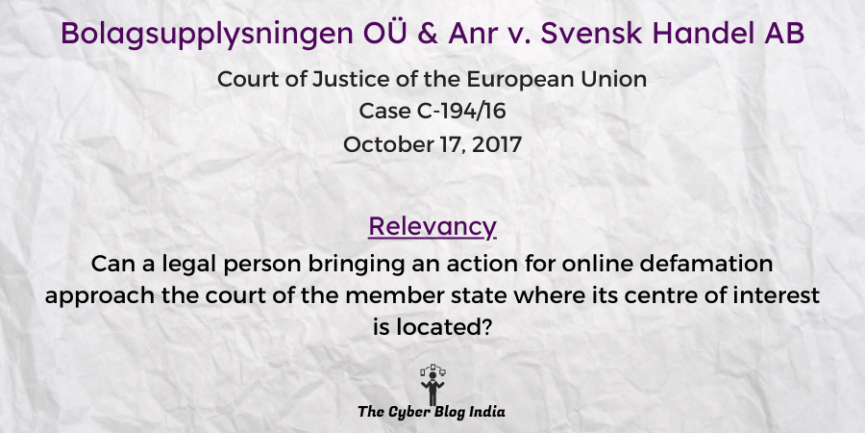Bolagsupplysningen OÜ & Anr v. Svensk Handel AB

Bolagsupplysningen OÜ & Anr v. Svensk Handel AB
In the Court of Justice of the European Union
Case C-194/16
Before the members of the Grand Chamber
Decided on October 17, 2017
Relevancy of the Case: Can a legal person bringing an action for online defamation approach the court of the member state where its centre of interest is located?
Statutes and Provisions Involved
- Regulation 1215/2012 (Article 4(1), 7(2))
Relevant Facts of the Case
- The first claimant is an Estonian company, while the second claimant is an employee of the first claimant.
- A Swedish trade association listed the first claimant in the blacklist on its website. This move saw over 1000 comments from internet users, affecting the claimants’ reputation.
- The claimants sued the defendant before an Estonian court. They asked the court to order the Swedish federation to rectify the information published on its website and remove the comments. While the District Court and the Court of Appeal rejected the claimant’s case, the claimants approached the Estonian Supreme Court.
- The Estonian Supreme Court, Riigikohus, referred this case to the European Court of Justice on the question of jurisdiction. The primary concern is the applicability of the concept of centre of interest to a legal person.
Prominent Arguments by the Counsels
- The claimant’s counsel argued that the Estonian courts have jurisdiction to hear the case. Their centre of interest is within the territory of Estonia. Most of the first claimant’s business operations are in Estonia. It transfers its income from Sweden to Estonia.
- The defendant submitted that there is no close connection between the claim’s subject matter and the jurisdiction of Estonian courts. The defendant’s seat is in Sweden; hence, the jurisdiction shall lie with the Swedish courts.
Opinion of the Bench
- The courts at the EU level have gradually extended the applicability of fundamental rights to legal persons, as appropriate. Personality rights of legal persons for the protection of good name and reputation are not uncommon in the member states. In the last few decades, the internet has changed the rules of publication. Hence, the applicability of the centre of interest concept should not differ, irrespective of whether the claimant is a natural or legal person.
- According to Article 7(2), there can be two possibilities for jurisdiction: first, where the event giving rise to harm took place, and second, the place where the harm occurred.
- When a legal person claims infringement of their personal rights on the internet, they can bring proceedings before the member state’s courts in which its centre of interest is located.
Final Decision
- The court ruled that any claimant who is a legal person can bring an action before the courts of the member state in which its centre of interests is located.
